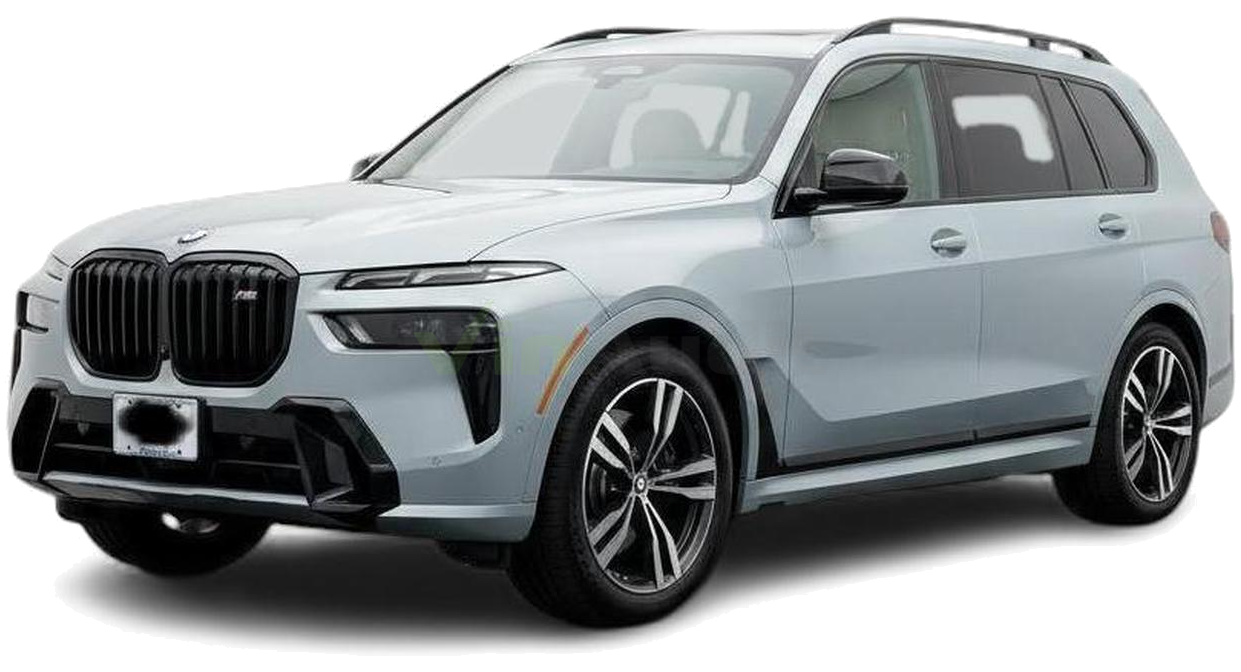The Good
The 2025 BMW X7 offers powerful engine options for exhilarating performance, from smooth daily driving to spirited acceleration, appealing emotionally. Practically, its robust build suggests good reliability. Exceptional cabin comfort, luxurious materials, and a sophisticated design provide an emotional appeal of prestige and indulgence. Despite its size, modern engines offer reasonable efficiency. While a luxury vehicle, its comprehensive feature set and strong resale value offer practical long-term value.
The Bad
Known weaknesses for the 2025 BMW X7 may include its high initial purchase price and premium ownership costs for maintenance and repairs. The third-row seating, while present, can be somewhat cramped for adults on long journeys. Some find the large grille design polarizing. Fuel efficiency, especially on higher-performance trims, can also be a point of concern for some buyers.
2025 BMW X7: Quick Overview
- Engine Options:
- xDrive40i: 3.0-liter TwinPower Turbo inline 6-cylinder with 48V mild-hybrid technology.
- M60i: 4.4-liter TwinPower Turbo V8 with 48V mild-hybrid technology.
- Alpina XB7: Exclusively tuned 4.4-liter TwinPower Turbo V8 with 48V mild-hybrid technology. - Horsepower:
- xDrive40i: Approximately 375 hp.
- M60i: Approximately 523 hp.
- Alpina XB7: Approximately 630 hp. - Fuel Economy (Estimated MPG):
- xDrive40i: Around 21 MPG combined (19 city / 25 highway).
- M60i: Around 18 MPG combined (16 city / 21 highway).
- Alpina XB7: Around 17 MPG combined (15 city / 20 highway). - 0-60 Times (Estimated):
- xDrive40i: Approximately 5.8 seconds.
- M60i: Approximately 4.5 seconds.
- Alpina XB7: Approximately 3.9 seconds. - Towing Capacity:
- Up to 7,500 lbs when properly equipped with the optional trailer hitch. - Trim-Level Features:
- xDrive40i: Standard features include a panoramic glass roof, BMW Curved Display (12.3-inch instrument cluster and 14.9-inch central touchscreen), iDrive 8 Operating System, heated front seats, power-adjustable steering column, multi-zone climate control, and a comprehensive suite of driver assistance systems. It rides on 21-inch wheels and features adaptive air suspension for a smooth ride.
- M60i: Builds on the xDrive40i with performance enhancements such as a more powerful V8 engine, M Sport brakes, M Sport differential, specific M aerodynamic package, M-tuned adaptive air suspension, and 22-inch M light-alloy wheels. Interior upgrades include M-specific styling cues, Merino leather upholstery options, and a Harman Kardon surround sound system.
- Alpina XB7: The pinnacle of the X7 lineup, featuring the most powerful engine, Alpina-specific chassis tuning, active roll stabilization, Alpina Sport Suspension, and unique 21-inch or optional 23-inch Alpina wheels. The interior boasts Alpina Lavalina leather, illuminated Alpina door sills, a unique Alpina digital instrument cluster, and handcrafted details for an exclusive feel. It often includes nearly all available options as standard, emphasizing ultimate luxury and performance.
2025 BMW X7 Specifications
Vehicle Information
| Year | 2025 |
| Make | BMW |
| Model | X7 |
| Trim | - |
| Style | - |
| Type | - |
| Category | - |
Manufacturing Details
| Made In | - |
| Manufacturing City | - |
Dimensions
| Doors | - |
| Curb Weight | - |
| Gross Vehicle Weight Rating | - |
| Overall Height | - |
| Overall Length | - |
| Overall Width | - |
| Wheelbase Length | - |
| Standard Seating | - |
Engine & Performance
| Engine | - |
| Engine Size | - |
| Engine Cylinders | - |
| Transmission | - |
| Transmission Type | - |
| Transmission Speeds | - |
| Drivetrain | - |
Additional Features
| Anti-Brake System | - |
| Steering Type | - |
Pricing
| Manufacturer Suggested Retail Price (MSRP) | - |
| Invoice Price | - |
| Delivery Charges | - |
Vehicle History Report
Specifications
History
Events
History Check
Check
Check
Check
Check
Listings
Recalls
Check
Analysis
What Problems Does the 2025 BMW X7 Have?
Common themes in older BMW models, which might translate to future X7 concerns, include potential issues with air suspension components (such as air springs or compressors) over time, especially in harsher climates or with high mileage. Electronic gremlins related to the extensive infotainment system (iDrive), sensors, or various driver-assistance features are also occasional points of complaint for some owners. While often resolved with software updates, persistent issues can be frustrating.
Engine-related problems, while not widespread for the B58 (inline-six) or N63/S68 (V8) engines in the X7, sometimes involve oil leaks or specific sensor failures as the vehicle ages. The mild-hybrid system components (48V battery, starter-generator) are relatively new additions to the X7 lineup in recent years, and their long-term durability is still being assessed across the industry. Recalls typically address specific safety or manufacturing defects and are announced by BMW and the NHTSA. Past recalls for X7 models have included issues like rear-view camera display problems, seat belt sensor malfunctions, and potential fuel pump issues on certain batches.
Overall, the X7 is generally considered a reliable luxury vehicle within its class, but it's not immune to the complexities inherent in modern, high-tech automobiles. Owners should be prepared for higher maintenance costs compared to non-luxury brands and adhere strictly to scheduled service intervals. Prospective buyers should always check the NHTSA website for any open recalls specific to the VIN of the vehicle they are considering, even for newer models, as recalls can be issued at any time.
How long will the 2025 BMW X7 last?
What Technology & Safety Features are Included?
Driver-assistance features are comprehensive and largely standard. These include Active Driving Assistant with features like Frontal Collision Warning, Active Blind Spot Detection, Lane Departure Warning, and Speed Limit Info. The optional Driving Assistant Professional package significantly enhances this with features like Highway Assistant (hands-free driving on compatible highways), Traffic Jam Assistant, Lane Keeping Assistant with side collision avoidance, and Evasion Aid. Parking Assistant Plus, with a surround-view camera system, is also standard, making maneuvering this large SUV easier.
Safety features are paramount in the X7, built on a robust high-strength steel and aluminum chassis. Standard safety includes multiple airbags, active head restraints, and a post-crash braking system. While specific 2025 crash-test ratings from agencies like NHTSA or IIHS are not yet available, previous model years of the X7 have consistently performed well in these evaluations, earning high marks for occupant protection and crashworthiness. BMW's commitment to safety is evident in the vehicle's structural integrity and its advanced suite of preventative and protective technologies, designed to mitigate accidents and protect occupants if a collision occurs.
What Colors Options are Available?
2025 BMW X7 Prices and Market Value
2025 BMW X7 Cost of Ownership
2025 BMW X7 Fuel Efficiency
2025 BMW X7 Insurance
reasonable repair costs.
How Does the 2025 BMW X7 Compare to Other Vehicle?
Performance: The X7, particularly the M60i and Alpina XB7, offers a more engaging and sporty driving experience than most rivals. Its precise steering and strong powertrains often outclass the GLS and Q7 in dynamic feel. The Escalade and Navigator are powerful but focus more on straight-line acceleration and comfort. The Range Rover offers exceptional off-road prowess in addition to its on-road performance, which the X7 doesn't prioritize as much.
Features: The X7's iDrive infotainment system and BMW Curved Display are among the best in class, offering intuitive operation and cutting-edge graphics. The GLS offers a similarly luxurious interior with its MBUX system. The Escalade boasts a massive OLED display that sets a benchmark for screen real estate. All offer extensive driver-assistance suites, but BMW's Highway Assistant is a notable differentiator. Interior materials and craftsmanship are top-tier across all these rivals, with subjective preferences playing a role.
Reliability: Reliability for all luxury vehicles can be a concern due to complexity. BMW generally has a good reputation, but maintenance costs are high. Mercedes-Benz and Audi are similar. Japanese rivals like the Lexus LX offer potentially better long-term reliability but often sacrifice some driving dynamism and cutting-edge tech. The Escalade and Navigator, built on truck platforms, often have robust powertrains but can still have electronic issues.
Price: The X7's pricing is competitive within its segment, starting in the mid-$80,000s and quickly climbing with options and higher trims. The GLS is similarly priced, while the top-tier Escalade, Navigator, and Range Rover can easily exceed the X7's upper range.
Alternatives:
- For sportier driving: Porsche Cayenne (though not a true three-row) or an Audi SQ7.
- For ultimate luxury & comfort: Mercedes-Benz GLS, Range Rover, or a top-trim Lincoln Navigator.
- For better reliability & lower ownership costs (with some compromise on features/performance): Lexus LX.
- For more cargo space & commanding presence: Cadillac Escalade or Lincoln Navigator.

